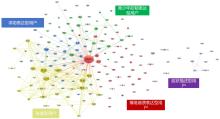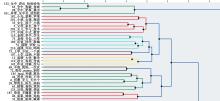| [1] |
唐婧云. 不同类型的在线抑郁社区特征及用户行为研究[D]. 哈尔滨: 哈尔滨工业大学, 2022.
|
|
TANG J Y. Research on characteristics and users behaviours of different types of online depression communities[D]. Harbin: Harbin Institute of Technology, 2022.
|
| [2] |
吴佳怡. 社交媒体平台抑郁症患者的网络表达与自我呈现探究: 以小红书社区为例[J]. 科技传播, 2023, 15(12): 130-132.
|
|
WU J Y. A study on online expression and self-presentation of depression patients on social media platform: Taking Xiaohongshu community as an example[J]. Public communication of science & technology, 2023, 15(12): 130-132.
|
| [3] |
程思宇, 阮建海, 邓小昭. 用户生成内容(UGC)平台用户数字囤积行为影响因素研究: 以小红书为例[J]. 图书情报工作, 2024, 68(4): 58-69.
|
|
CHENG S Y, RUAN J H, DENG X Z. Research on influencing factors of users' digital hoarding behavior on user-generated content platforms: Taking Xiaohongshu as an example[J]. Library and information service, 2024, 68(4): 58-69.
|
| [4] |
BRODIE R J, HOLLEBEEK L D, JURIĆ B, et al. Customer engagement: Conceptual domain, fundamental propositions, and implications for research[J]. Journal of service research, 2011, 14(3):252-271.
|
| [5] |
DAUGHERTY T, EASTIN M S, BRIGHT L. Exploring consumer motivations for creating user-generated content[J]. Journal of interactive advertising, 2008, 8(2): 16-25.
|
| [6] |
SHAHBAZNEZHAD H, DOLAN R, RASHIDIRAD M. The role of social media content format and platform in users' engagement behavior[J]. Journal of interactive marketing, 2021, 53: 47-65.
|
| [7] |
朱玲, 张薇薇. 知识付费情境下在线用户参与行为影响因素研究综述[J]. 图书馆学研究, 2021(2): 9-18, 8.
|
|
ZHU L, ZHANG W W. Review on online users' participation behavior in the context of knowledge payment[J]. Research on library science, 2021(2): 9-18, 8.
|
| [8] |
周阳, 谭春辉, 朱宸良, 等. 基于扎根理论的虚拟学术社区用户参与行为研究: 以小木虫为例[J]. 情报科学, 2022, 40(1): 176-183.
|
|
ZHOU Y, TAN C H, ZHU C L, et al. Virtual academic community users' engagement practices based on the grounded theory: Taking the small woodworms as an example[J]. Information science, 2022, 40(1): 176-183.
|
| [9] |
KHOBZI H, LAU R Y K, CHEUNG T C H. The outcome of online social interactions on Facebook pages[J]. Internet research, 2019, 29(1): 2-23.
|
| [10] |
DOLAN R, CONDUIT J, FRETHEY-BENTHAM C, et al. Social media engagement behavior[J]. European journal of marketing, 2019, 53(10): 2213-2243.
|
| [11] |
吴晨煜, 赵宇翔, 宋士杰, 等. 科普互动视频中交互特征对用户参与行为的影响[J]. 图书馆论坛, 2025, 45(3): 141-152.
|
|
WU C Y, ZHAO Y X, SONG S J, et al. The impact of interactive features on user engagement behavior in interactive videos for science popularization[J]. Library tribune, 2025, 45(3): 141-152.
|
| [12] |
于灏, 王鼎立, 白丽, 等. 内容策略视域下的企业号短视频用户参与行为研究[J]. 情报科学, 2023, 41(11): 85-93, 150.
|
|
YU H, WANG D L, BAI L, et al. User engagement behaviors of enterprise account short-form videos from the perspective of content strategies[J]. Information science, 2023, 41(11): 85-93, 150.
|
| [13] |
李力, 张弘, 郑方圆, 等. 需求驱动下虚拟数字人用户在线参与行为研究[J]. 情报资料工作, 2025, 46(1): 90-99.
|
|
LI L, ZHANG H, ZHENG F Y, et al. Research on the online participation behavior of virtual digital human users driven by demand[J]. Information and documentation services, 2025, 46(1): 90-99.
|
| [14] |
姜钰莹. 基于微博的抑郁倾向人群用户画像构建[D]. 长春: 吉林大学, 2021.
|
|
JIANG Y Y. Construction of user portrait of depressed people based on weibo[D]. Changchun: Jilin University, 2021.
|
| [15] |
中尾睦宏, 曲成业. 抑郁倾向[J]. 日本医学介绍, 2001, 22(7): 316-317. ,
|
|
NAKAO M, QU C Y. Depressive tendency[J]. Progress in Japanese medicine, 2001, 22(7): 316-317.
|
| [16] |
YAO X X, YU G, TIAN X Y, et al. Patterns and longitudinal changes in negative emotions of people with depression on sina weibo[J]. Telemedicine journal and e-health, 2020, 26(6): 734-743.
|
| [17] |
门秀萍, 魏瑞斌, 吴小兰. 社交网络中的抑郁症用户语言和行为特征分析及检测[J]. 现代情报, 2020, 40(6): 76-87.
|
|
MEN X P, WEI R B, WU X L. Analysis and detection of language and behavior characteristics of depression in social network[J]. Journal of modern information, 2020, 40(6): 76-87.
|
| [18] |
RESNIK P, ARMSTRONG W, CLAUDINO L, et al. Beyond LDA: Exploring supervised topic modeling for depression-related language in twitter[C]//Proceedings of the 2nd Workshop on Computational Linguistics and Clinical Psychology: From Linguistic Signal to Clinical Reality. Denver, Colorado. Stroudsburg, PA, USA: ACL, 2015: 99-107.
|
| [19] |
王哲, 向菲. 抑郁类在线健康社区用户参与行为现状及病耻感对其影响研究[J]. 医学信息学杂志, 2023, 44(12): 8-14, 28.
|
|
WANG Z, XIANG F. Study of the participation behavior status of depressive online health community users and the influence of stigma on it[J]. Journal of medical informatics, 2023, 44(12): 8-14, 28.
|
| [20] |
TIAN X Y, BATTERHAM P, SONG S, et al. Characterizing depression issues on sina weibo[J]. International journal of environmental research and public health, 2018, 15(4): 764.
|
| [21] |
方振宇. 基于词向量的微博用户抑郁预测方法研究[D]. 合肥: 合肥工业大学, 2017.
|
|
FANG Z Y. Research on depression prediction method of Weibo users based on word vectors[D]. Hefei: Hefei University of Technology, 2017.
|
| [22] |
罗亚玲, 赵泽瑞. 自我决定理论及其在我国信息资源管理领域的应用与展望[J]. 图书馆学研究, 2025(2): 13-21.
|
|
LUO Y L, ZHAO Z R. Self-determination theory and its application and prospects in the field of information resource management in China[J]. Research on library science, 2025(2): 13-21.
|
| [23] |
DECI E L, RYAN R M. Self-determination theory: A macrotheory of human motivation, development, and health[J]. Psychologie canadienne, 2008, 49(3): 182-185.
|
| [24] |
赵立, 付兵. 如何吸引我: 个性化推荐促进用户习惯形成的作用机制[J]. 财经论丛, 2025(2): 88-100.
|
|
ZHAO L, FU B. How to attract me: The underlying mechanism of user habit formation facilitated by personalized recommendations[J]. Collected essays on finance and economics, 2025(2): 88-100.
|
| [25] |
范哲, 刘奔. 用户人格特质对虚拟社区信息分享行为的影响研究: 以基本心理需要为中介变量[J]. 现代情报, 2019, 39(11): 69-79, 97.
|
|
FAN Z, LIU B. The effect of personality traits on information sharing in the virtue community: Based on basic psychological needs as intermediaries[J]. Journal of modern information, 2019, 39(11): 69-79, 97.
|
| [26] |
GAGNÉ M, DECI E L. Self-determination theory and work motivation[J]. Journal of organizational behavior, 2005, 26(4): 331-362.
|
| [27] |
张敏, 赵雅兰, 张艳. 基于自我决定理论的科研工作者知识利用行为形成机制与路径[J]. 图书馆杂志, 2018, 37(10): 12-19.
|
|
ZHANG M, ZHAO Y L, ZHANG Y. Formation mechanism and path of researchers' knowledge utilization behavior based on self-determination theory[J]. Library journal, 2018, 37(10): 12-19.
|
| [28] |
余来辉, 金恒江. 突发公共卫生事件中网络社群用户参与行为影响因素研究: 基于SDT和TPB整合模型[J]. 新世纪图书馆, 2021(9): 20-28.
|
|
YU L H, JIN H J. Research on the factors affecting online community users' participating behavior in public health emergency: Based on SDT and TPB integration model[J]. New century library, 2021(9): 20-28.
|
| [29] |
袁留亮. 基于自我决定理论的在线科研社群知识共享研究[J]. 现代情报, 2016, 36(2): 20-24.
|
|
YUAN L L. Construction of knowledge sharing concept model in online research community based on self-determination theory[J]. Journal of modern information, 2016, 36(2): 20-24.
|
| [30] |
ZHANG Y. Understanding the sustained use of online health communities from a self-determination perspective[J]. Journal of the association for information science and technology, 2016, 67(12): 2842-2857.
|
| [31] |
张博, 赵一铭, 乔欢. 基于自我决定理论的用户参与协同知识生产的动机因素探究[J]. 现代情报, 2016, 36(9): 95-100.
|
|
ZHANG B, ZHAO Y M, QIAO H. The factors explored of user participation in collaborative knowledge production based on the theory of the self-determination motivation[J]. Journal of modern information, 2016, 36(9): 95-100.
|
| [32] |
耿瑞利, 申静. 不同文化视域下社交网络用户知识共享行为动机研究[J]. 中国图书馆学报, 2019, 45(1): 60-81.
|
|
GENG R L, SHEN J. Research on SNS users' knowledge sharing motivation from different cultural perspectives[J]. Journal of library science in China, 2019, 45(1): 60-81.
|
| [33] |
相甍甍, 孙畹婷, 王晰巍, 等. 在线健康社区用户复合信息行为的实证研究: 信息共享和信息搜寻同步的视角[J]. 情报科学, 2022, 40(7): 111-119, 135.
|
|
XIANG M M, SUN W T, WANG X W, et al. An empirical study on users' composite information behavior in online health community: From the perspective of information sharing and information search synchronization[J]. Information science, 2022, 40(7): 111-119, 135.
|
| [34] |
AJZEN I. From intentions to actions: A theory of planned behavior[J]. Action control: From cognition to behavior/Springer, 1985:11-39.
|
| [35] |
CHEN X, SUN M X, WU D, et al. Information-sharing behavior on WeChat moments: The role of anonymity, familiarity, and intrinsic motivation[J]. Frontiers in psychology, 2019, 10: 2540.
|
| [36] |
WANG W T, HOU Y P. Motivations of employees' knowledge sharing behaviors: A self-determination perspective[J]. Information and organization, 2015, 25(1): 1-26.
|
| [37] |
VENKATESH V, DAVIS F D. A theoretical extension of the technology acceptance model: Four longitudinal field studies[J]. Management science, 2000, 46(2): 186-204.
|
| [38] |
张岌秋. 虚拟社区信息获取与信息共享意愿和行为的实证研究[J]. 情报科学, 2015, 33(8): 59-64, 119.
|
|
ZHANG J Q. Empirical research on information acquiring and information sharing intention and behavior in virtual communities[J]. Information science, 2015, 33(8): 59-64, 119.
|
| [39] |
谷重阳, 徐浩煜, 周晗, 等. 基于词汇语义信息的文本相似度计算[J]. 计算机应用研究, 2018, 35(2): 391-395.
|
|
GU C Y, XU H Y, ZHOU H, et al. Text similarity computing based on lexical semantic information[J]. Application research of computers, 2018, 35(2): 391-395.
|














